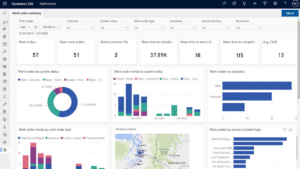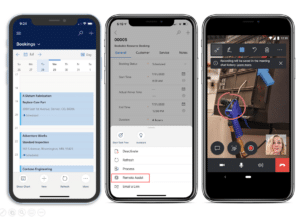CRM: The Key to Unlocking Exceptional Customer Service in Field Service Management
Investing in a CRM solution such as Dynamics 365 Customer Service, can optimize your customer service in Field Service Management.
Table of Content
Forgive us for bringing up something so incredibly obvious. But – today’s customers expect personalized, connected experiences from the companies they work with. It doesn’t matter if they’re ordering paper towels via Prime or Pad Thai from an app.
Blame Amazon, Uber, or your least favorite 2010s tech unicorn, but the proliferation of “big data” and constant “disruption” have changed every industry on the planet – and there’s no turning back.
While field services orgs have been able to hang on to old ways a bit longer than their counterparts in more “exciting” sectors, the “customer expectation trickle-down” has finally come for them, too.
In other words, companies need to invest in solutions that allow them to better serve their customers – and, really, help them survive in this challenging, complex environment. With that in mind, CRMs have become a core staple of any good FSM stack. Read on and we’ll explain why.
CRMs give field service orgs that 360-degree view they need to transform service operations.
These platforms offer the in-depth insights you need to understand your customers – allowing you to find and fill gaps between expectation and reality.
Dynamics 365 Customer Service includes several reporting tools that make it easy to measure agent actions and financial performance against customer KPIs.
For example, D365 users might use Customer Journey Analytics, Sentiment Analysis, or Post-Service Engagement Surveys to identify opportunities for improvement.
The D365 Field Service module includes more field-specific reports that analyze things like asset performance, resource utilization, and work order outcomes – allowing you to improve the customer experience by focusing on the back-end.

D365’s built-in AI automatically surfaces trending topics and insights based on critical metrics so you know where to focus your efforts.
For more complex issues, the themes in your dashboard serve as a jumping off point for further investigation.
Say, for example, you’re tracking customer sentiment by asset. You might notice that a large share of unhappy customers use the same piece of equipment, and, maybe, upon further investigation, you learn that technicians typically can’t fix X or Y problem on the first visit.
From there, you might look at technician performance, evaluate training materials, etc. to determine what’s really going on and make changes so that techs are better prepared moving forward.
CRMs give field service teams the ability to solve problems and capture meaningful feedback while on the job.
For example, mobile CRM apps allow techs to access training docs and support from more experienced colleagues. And – they make it easy to order parts, submit reports, and document their progress/update records, as they work through each task.
One Microsoft customer, Siemens, built an intelligent service platform using D365 Field Service, Azure, and Office 365. The goal was enabling employees to quickly respond to and resolve customer issues, streamline communication, and adapt to changing conditions.
You might also invest in solutions like D365 Remote Assist to help technicians solve problems in real-time – in some cases, without visiting customer sites. Remote Assist is an add-on solution that extends the capabilities of D365 Field Service.
So, if techs are already using D365 to manage work orders, view bookings and routes, and communicate with colleagues, Remote Assist can connect them with additional support.
For example, they can call an expert for help and start collaborating on a solution, without leaving the app. Remote users can instantly access data re: accounts, service histories, equipment, and parts.
Meanwhile, techs can live stream the service, allowing experts to walk them through the repair one step at a time.

Another Microsoft customer, Avacon Natur built a comprehensive system from the D365 Finance and Project Operations ERP solutions, plus several CRM modules: Sales, Field Service, Customer Service, and Marketing.
That integrated platform gave Avacon Natur a consistent data structure across all locations, departments, and divisions, and allowed them to digitize the entire customer lifecycle.
Field teams can now quickly access all information related to individual customers and service calls. They can instantly see what parts and tools are available before heading out for a job.
The company also gained the ability to automatically generate maintenance schedules and assign work orders. What’s more, they now have the granular insights they need to help customers reach carbon emissions goals.
CRM solutions allow field service organizations to deliver unified service experiences across all channels and provide a mix of self-service and assisted support options.
People expect companies to provide a mix of support options. It’s annoying to hop on the phone to get an answer to a really basic question. It’s also annoying to be forced into a chatbot interaction when you already know that you’re dealing with a nuanced issue and need to get a real human on the line.
If you’ve ever had a real niche problem with your Google account or apps like Uber, you’ve probably experienced material pain because you couldn’t connect with an actual human.
Algorithms aren’t great at solving one-off problems because training data often doesn’t cover rare scenarios (or issues they have yet to discover). Outsourced teams, too, often lack the context and authority needed to fix these sorts of issues.
D365 Customer Service includes several features that enable 24/7 cross-channel support. Knowledge base portals and virtual agents allow customers to access support on their own, while conversational chatbots can answer questions and provide helpful resources after hours.
D365 Field Service allows you to set up self-service scheduling, so customers can book services at their convenience.

At its core, field service management is all about serving the customer. CRMs are designed for that exact purpose. However, finding a solution that works for you involves way more than a few Google searches and a quick scan for any red flag reviews.
Crucial as they are, CRMs are only as useful as the stack they’re connected to. It’s not just about record-keeping and communication. It’s about capturing the right information and leveraging it in a way that ensures customers get the most from this relationship.
You want to find a solution that handles all customer-facing interactions, streamlines back-end ops, and empowers all employees to do their best work.
What we’re saying is, choosing a CRM (or, more realistically, CRMs) is more about filling gaps your ERP doesn’t cover. That might mean subscribing to a few extra D365 modules, adding on ISV solutions, or building custom apps from scratch.
Velosio’s field service practice combines decades of Microsoft expertise with real-world field service experience. Our FSM pros have led hundreds of field service transformations. They’ve helped clients navigate planning, selection, and implementation. And — they’ve stuck around to support training, change management, and long-term optimization efforts.
Talk to us about how Velosio can help you realize business value faster with end-to-end solutions and cloud services.
"*" indicates required fields